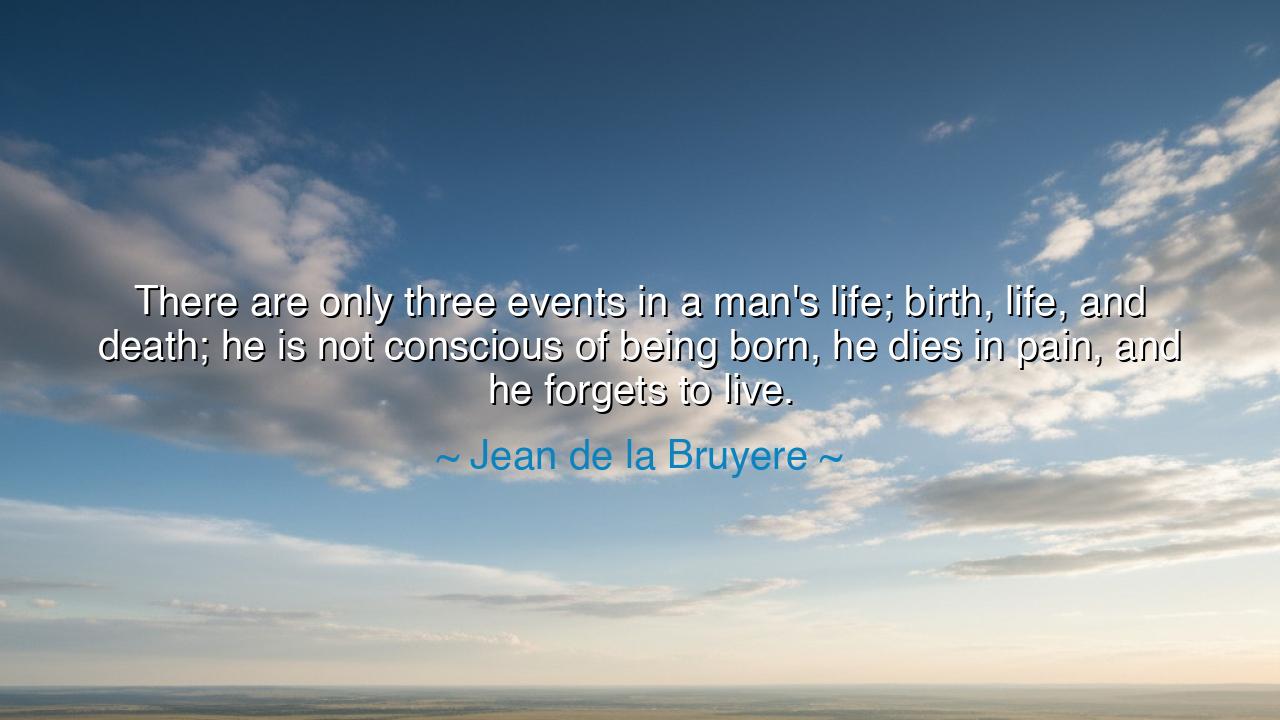
There are only three events in a man's life; birth, life, and
There are only three events in a man's life; birth, life, and death; he is not conscious of being born, he dies in pain, and he forgets to live.






“There are only three events in a man’s life; birth, life, and death; he is not conscious of being born, he dies in pain, and he forgets to live.” Thus wrote Jean de la Bruyère, the sharp-eyed moralist of seventeenth-century France, whose words pierce the vanity of man as a sword pierces armor. Beneath the surface of this simple triad—birth, life, and death—lies the lament of a soul who saw how men drift through existence asleep, mistaking motion for meaning, and years for life itself. His words are not a condemnation, but a wakeful cry to remember what it means to live before time claims us back into silence.
In this quote, La Bruyère draws upon the eternal rhythm of human destiny. We are born without knowing it; our first breath is a mystery, our first cry an instinct. We die often unwillingly, with fear or regret clinging to our final moments. Between these two unchosen gates lies life—the only realm where choice, creation, and consciousness dwell—and yet, paradoxically, it is this middle span that we most neglect. Men strive, toil, and worry, forgetting that to live is not merely to exist, but to awaken, to feel, to wonder, to love. The philosopher’s grief is that humanity has made of life a passage between two fogs, never lifting its gaze to the stars that shine above it.
There is an ancient parable of a traveler who, wandering through a desert, found a spring hidden among the stones. He bent to drink but thought, “I will save my thirst for later, when I am truly in need.” He journeyed on, but the desert stretched longer than he dreamed, and before he returned to the spring, he perished. So too does man live—postponing joy, deferring peace, saying, “One day I will rest, one day I will love, one day I will live.” But the spring of life lies not ahead—it is here, now, at the feet of the living soul.
Consider Leo Tolstoy, who, in the midst of wealth, fame, and family, was tormented by a single thought: “What is the meaning of my life?” Though he had achieved all that the world could offer, he found himself near despair, standing on the edge of death, realizing he had forgotten how to live truly. In his later years, he renounced his luxuries, walked among peasants, and sought humility and simplicity. In rediscovering compassion and truth, he found at last a kind of birth before death—a life awakened within life itself. His transformation stands as a living echo of La Bruyère’s warning: to remember life before it is too late.
The pain of death reminds us that we have not yet mastered the art of life. It is not death itself that terrifies, but the knowledge of unlived days. We fear not the darkness of the grave, but the dimming of a light we never tended. Yet there is hope, for to live consciously is within every man’s reach. One need not be a philosopher or a saint to awaken; one must only pause, breathe, and look upon the world not as a battlefield of ambition, but as a temple of moments—each heartbeat a sacred drum calling us back to presence.
La Bruyère’s words, though centuries old, still strike the restless hearts of modern men and women. In an age of endless haste, we are born without reflection, we die without peace, and we rush through the middle, forgetting to live. But life is not a race to the grave; it is a garden to be tended, a song to be sung while the voice is strong. The wise understand that the ordinary—sunlight on a window, laughter shared, silence kept—is where the divine hides.
The lesson, then, is both ancient and urgent: awaken to your own existence. Be not unconscious at your beginning, nor fearful at your end, nor forgetful in your journey. Live deliberately. Love deeply. Pause often. Speak truthfully. Let each dawn be a new birth, each night a gentle death, and each moment between them a full and radiant life.
For when the final breath comes, may it not find you among those who “forgot to live.” Let it find you smiling, as one who drank deeply from the well of being, who turned the brief spark of consciousness into a flame that outshines the grave. Only then will birth, life, and death form not a tragedy, but a triumph—a circle completed in wisdom and peace.






AAdministratorAdministrator
Welcome, honored guests. Please leave a comment, we will respond soon